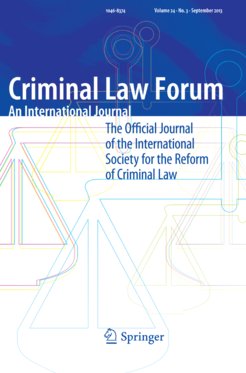Now Out: Criminal Law Forum Special Issue
In Celebration of Michael Tonry’s Distinguished Career
To honor the remarkable career of Michael Tonry, the Max Planck Institute for the Study of Crime, Security and Law announces the publication of a special issue of Criminal Law Forum, the flagship journal of the Society for the Reform of Criminal Law: “Celebrating the Career of Michael Tonry”. Tonry is one of the world’s most influential scholars in the fields of criminal justice, sentencing, and penal policy as well as an external scientific member of the Max Planck Society.

As a leading American criminologist with long-standing engagement in Europe, Tonry’s career demonstrates his dedication to criminal justice reform and comparative legal studies. His life’s work spans national and comparative criminal law issues—particularly in sentencing, punishment, and racial injustice. The former professor of law and public policy and prolific author is widely recognized for his influential research into incarceration rates and racial/ethnic disparities in criminal justice.
The special issue, “Celebrating the Career of Michael Tonry“, is co-edited by Alessandro Corda, who is a Barbara Huber Fellow in the Department of Criminal Law at the Max Planck Institute and Reader in Criminal Law and Criminal Justice at Queen’s University Belfast, and by Julian Roberts, Professor at the University of Oxford. It has its origins in a workshop held in Freiburg in May 2024, “Key Issues in Criminal Justice: A Celebration of Michael Tonry’s Career”, which was organized with the guiding support of the Institute’s directors, Tatjana Hörnle and Jean-Louis van Gelder. The event convened leading international scholars to reflect on Tonry’s substantial contributions to criminal law, criminology, and criminal justice and to explore the enduring impact of his work on penal reform and punishment theory.
The contributions in the special issue deal with core themes that have defined Tonry’s scholarship: comparative sentencing policies and practices, the effectiveness and legitimacy of criminal law, the ethics and purpose of punishment, and the role of empirical research in shaping effective and just criminal justice systems. The publication serves both as recognition of a distinguished academic career and as a catalyst for continued scholarly dialogue on the pressing issues Michael Tonry has long addressed.
